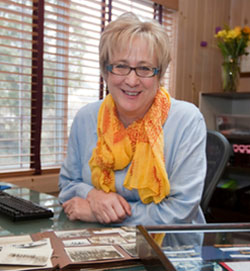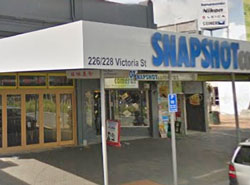The Association of Personal Photo Organizers (APPO) was founded in 2009 by Cathi Nelson, former executive of Creative Memories, a leading US scrapbooking company.

APPO membership has grown to 500+, predominantly in the US, and this week it is holding its annual conference in Orlando Florida.
With the recent focus on the challenge of organising photos in the digital era generated by comments from Google executive Vint Cerf about a ‘Digital Dark Age‘, perhaps the personal photo organisers’ time has finally come. We look at a presentation by Cathi Nelson (via a report in Don Franz’ Photo Imaging News) and add some insights from a local member of APPO.:
How the Emerging Profession of Photo Organizing is Reconnecting People with Their Photos, was the title of an address from Cathi Nelson and Lisa Kurtz, Association of Personal Photo Organizers (www.appo.org) at the PMA conference in Las Vegas in January.
Photo Imaging News reported on the presentation, noting that while the number of digital photos has exploded, there has been little effort (to put it kindly) ‘to educate consumers on best practices such as naming, collating, and protecting those precious images.’
The average person doesn’t have any back-up plan for ensuring thier pictures are safe, or even a system for finding their favourite photos.
Both digital images and hard copy photos are at risk, with literally billions of photos taken each month, few of which are properly organised, and estimates of up to 1.7 trillion photos stored in albums or shoeboxes in the attic, etc (1000 memories).
While people have collections they would consider priceless, the amount of time and effort to organise, sort, and collate a collection is seen as overwhelming – so it’s a task which gets put into the too-hard basket.
Cathi Nelson noted that video has been a particular focus for photo organisers. She said that in the US there was up to 12 billion hours of footage of family events – new babies, first steps, weddings, barbecues, etc, but video tape was never meant to be a permanent medium, with irreparable deterioration looming after 20 years. Less than 1 percent of these memories have been transferred to digital, and with video players moving towards obsolescence, the remaining 99 percent are on the brink of being lost forever, if they aren’t already.
She outlined how a photo organiser can be the solution to the dilemma: Photo Organizers in the US work with an average of 4-6 clients/month, primarily women, who generally come from higher income brackets, often in a household with both partners working. This female-dominated customer group spans three specific age demographics: working mothers of school age children; working mothers of adult children, new grandparents; and newly retired mothers/’young seniors’ who have put off the task of organising photos as a retirement project.
They have a strong desire to capture and document their children’s lives and pass on a legacy of photos and stories; and they recognise the emotional impact that photos have and how positive memories and experiences contribute to the self-esteem and emotional health of their family. Besides their own collections, they may also possess their parent’s collections, which might include heritage photos, slides, and 35mm and 16mm film movies.
Retirees and young senior clients are downsizing, or planning to downsize, and struggle with the complexities of duplicating and dividing their photo collections to pass down to multiple children. This group of women have put off organising their photos and view this task as a ‘retirement project’. They are more likely to be more ‘hands-on’ in the process by working alongside the photo organiser and/or learning through the organiser.
She said that photo organisers tend to create strong relationships with clients as they learn family members names, birth dates, and other important details to organize timelines and photo groupings. Clients share family stories and insights ‘that often result in a level of intimacy that we feel is unique to photo organizers and critical to their ongoing, long term relationship.’
She listed the five most common services offered by photo organisers:
– organising printed photos;
– organizing digital photos;
– scanning;
– converting home movies;
– creating photo output such as photobooks, scrapbooks, slideshows, wall displays, and photo gifts.
Photo Organisers charges an hourly fee and invoices the client based on the time involved in the project. Many Organisers set a minimum standard for their services, and often bundle hours such as half-day or full-day. Organszers may also offer packages that include a finite number of hours with some sort of completed project like a photo book.
Organisers can also tap into other revenue streams such as product commissions, discounts, referral fees, and subcontracting fee.
In addition to the core customer segment of family women, several secondary markets were noted:
– Businesses, associations and organisations with photo collections and archives that need to be digitised and documented;
– Genealogists – tracing family history and research where the focus is often on collecting information, photographs, and artefacts.
– Divorce and estate attorneys with clients’ photo collections that need to be duplicated and divided, often amidst emotional family circumstances.
– Single working fathers – in most cases as a result of divorce, separation, or loss of spouse who was the family archivist and keeper of photos.
The local scene
Personal Photo Organisers are thin on the ground in Australia and New Zealand, with Jill Boswell (Snapshot Cameras, Hamilton) holding the fort single-handedly across the ditch, and just seven listed in the APPO website as Australian-based.
Interestingly, while one of those is a well-known photo retailer (Jann Gallen, Digtial Prints & Images, Bathurst) the other six (all women) offer photo organising as a standalone service (The Filing Fairies) or as a complementary business within the emerging personal organiser/de-clutter service industry. For instance, Pack Up Your Troubles is ‘a Melbourne based business dedicated to organising, decluttering, packing & unpacking and removing unwanted household goods.’ (And organising your photos.) Both these businesses are also members of the Australasian Association of Professional Organisers (AAPO) as well as (APPO)…just as APPO is an affiliate of the US National Association of Personal Organizers (NAPO). (Still following?)
 Over in Hamilton, NZ, Jill Boswell has incorporated photo organising into Snapshot Cameras Photo Archiving business. Snapshot Cameras offers classes in photo organising as part of a broader category of business which incorporates retouching and restoration, scanning, slides and photos to digtial, etc. Snapshot also distinguishes itself by getting behind the annual ‘Save Your Photos’ Day which APPO is affiliated with.
Over in Hamilton, NZ, Jill Boswell has incorporated photo organising into Snapshot Cameras Photo Archiving business. Snapshot Cameras offers classes in photo organising as part of a broader category of business which incorporates retouching and restoration, scanning, slides and photos to digtial, etc. Snapshot also distinguishes itself by getting behind the annual ‘Save Your Photos’ Day which APPO is affiliated with.
‘I definitely think there is a future for these services – as people capture more and more photos with their phones they’ll need help backing up and sharing the photos that matter,‘ she wrote.
She outlined how photo organising has fared within Snapshot Cameras’ business:
As retailers we have a different focus than other APPO members. Initially I’d hoped to be rushed off my feet with home visits, but that didn’t happen.
For us it tends to be classes and I had a good uptake on my Free classes on Save Your Photos Day last September.
I do about half a dozen home visits a year to help people organise their digital photos – not much demand for the physical organising. They learn enough in my classes to do that themselves.
I give (free) talks to geneaology and senior groups but trying to look for ways to get into the younger age groups. In every monthly newsletter I provide a photo organising tip and remind readers I can help them. I had a stand at a Womens Lifestyle Expo last year but despite interest got no home appointments – just class registrations.
I’m a member of a local women’s networking group where I wear my ‘photo organising hat’ and one lady said the other day that my services are so important.
I have a relationship with a ‘move manager’ who helps people downsize their homes but no jobs from there yet.
Plenty of people come in to the store and say ‘I must get you to visit me one of these days to help me ……’ so they are aware of what I do.
In each class or talk I mention digitising physical photos and slides and show them two options – buy a gadget (Flip Pal ad/or Slide converter) or let Snapshot do it for you. This does generate scanning jobs so helps there.
We’re still researching a replacement for our HP system – one important requirement is that it will easily print from phones and tablets. Once this is up and running we’re going to start doing camera phone classes with a strong emphasis on organising photos from the phones and printing the ones that matter.
I believe ARCHIVING is an important part of any photographic business – it includes all the scanning, video conversions and photo restoration work we do. What the photo organising does is go one step back – we help people sort their photos so they can find the PHOTOS THAT MATTER – the ones they will bring in for scanning, restorations and printing. We also show them how to organise their photo collections so they can find the photos again (leading to more prints in the future) and teach them how to back-up their collections.
As people take more and more photos with mobile devices there’s going to be more demand for someone to help them sort the good from the bad! The photo industry should be there and if not doing it ourselves then working alongside a certified Photo Organiser.
I keep reading articles in industry magazines about ‘photo organising’ apps and software so it is becoming part of our vocabulary – not sure how the industry as a whole can increase awareness but with Cathi Nelson and Georgia McCabe working together it may happen.
– Jill Boswell, Snapshot Photo
 The Association of Personal Photo Organizers offers ‘International Membership’ for US$250 which provides a range of benefits including some introductory training in photo organizing and a 50 percent discount for the course which leads to full APPO accreditation.
The Association of Personal Photo Organizers offers ‘International Membership’ for US$250 which provides a range of benefits including some introductory training in photo organizing and a 50 percent discount for the course which leads to full APPO accreditation.





Be First to Comment